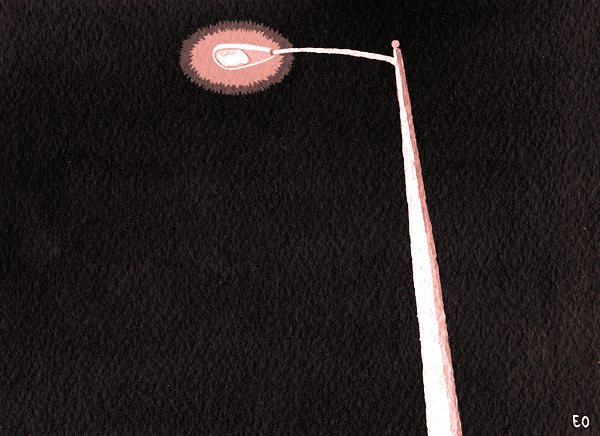Mr. McClendon used to throw rocks at the streetlight on the corner at three in the morning. Why he did this naked remains a mystery. His aim wasn’t great and some nights it took him more than an hour to shatter the bulb. He used stones from our driveway, which somehow made us complicit and this was thrilling. The broken-streetlight epidemic was attributed to “idle neighborhood hoodlums,” a blanket of blame that included my brother and me. We didn’t deny this. And we held the secret, held it to this day. Here is a useless revelation: I witnessed some petty vandalism in Illinois in 1974. The perpetrator is now deceased.
Mr. McClendon worked for the phone company. It was said he married Mrs. McClendon (formerly Mrs. Hartlief ) for love, not money. Whether she loved him back is still open to speculation, but the word was she had lots of money. She also had a black corgi named Cassandra, actually a succession of black corgis named Cassandra. When one died, she got a meaner one.
Seeing Mr. McClendon out there naked was startling. In the mornings he’d leave his house, an ordinary man in an ordinary suit. Without clothes, at three in the morning, he was a pale old man with loose skin and too little body hair. In the bright yellow of that streetlight, stooping to gather up another stone, he looked—dead.
“He’s committing symbolic suicide,” my brother said.
“He’d rather be dead, but he lacks the courage so he takes it out on Commonwealth Edison, which isn’t a bad choice really.”
“Why’s he do it naked?”
“This sort of thing has to be done as purely as possible.”
“And in the morning?” I asked.
“In the morning what?”
“In the morning does he want to be dead?”
My brother looked at me, his tongue roving beneath his lower lip. Hadn’t I learned a single thing in six years of tutelage under his masterfulness?
“In the morning he works for the phone company.”
“Oh.”
After Mr. McClendon officially died (a stroke, though my brother said this was a cover-up), Mrs. McClendon remarried and her name changed to Mrs. Franconi. Mrs. McClendon when she was Mrs. McClendon had no children with Mr. McClendon. But during this period there were at least two Cassandras. Mrs. McClendon is dead now also, as are her third and fourth husbands, Mr. Franconi (Hugo) and Mr. Roger W. Hall, respectively. As far as I know, this is one of the few records of Mr. McClendon having existed. This is a small memory. Most of my memories are small.
My brother and I never talk about him. I don’t know why, exactly, but it is as though there’s an unspoken agreement between us to at least give him the peace of his grave. Why broadcast the private pain of a man who only wanted to sleep without the light?
It must have shined into his bedroom window. But his hatred for the streetlight went beyond the light, my brother said, to the idea of the light. How it lorded it over our corner, shining over… what? Keeping watch over what? Couldn’t it leave our street’s little miseries alone? Not white, but yellow, like some unnatural, radioactive egg.
Bad toss after bad toss and my brother and I (chomping peanut M&Ms in the dark) would watch Mr. McClendon from our bedroom window. He was shriveled and beautiful in his sad way and my brother and I hoped he wouldn’t hit it so we could watch him longer. His loneliness was inspiring, heroic, relentless. When he finally did connect, the merciful darkness was always short-lived. Isn’t it always? It usually took less than a week for Com Edison to come out with the truck with the long arm and the big white bucket.





